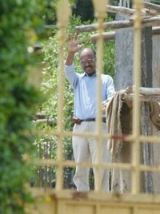US, EU press Ethiopia to release detainees after clashes
Nov 6, 2005 (ADDIS ABABA) — The U.S. and European Union pressed Ethiopia Sunday to end its crackdown on independent media and to release opposition leaders detained during a week of bloody clashes between demonstrators and police, according to a statement.
 The government of Prime Minister Meles Zenawi also must allow access to thousands of people detained in the crackdown, the E.U.-U.S. statement said.
The government of Prime Minister Meles Zenawi also must allow access to thousands of people detained in the crackdown, the E.U.-U.S. statement said.
Top Western diplomats said they were discussing a suspension in aid to the country. Together the U.S. and EU are giving some $1.3 billion in aid to Ethiopia this year.
The violence, which has left at least 46 people dead, has undermined efforts to build democracy and has “damaged Ethiopia’s international reputation,” the U.S. and E.U. said in a statement, read Sunday by U.K. Ambassador Bob Dewar.
Meles said Sunday he regrets the deaths of the people killed in the clashes, but insisted that police weren’t facing a normal situation in the conflicts.
The prime minister was speaking in Germany where he attended a conference called “Partnership with Africa,” convened by German President Horst Koehler, a former head of the International Monetary Fund.
“We regret the deaths but it wasn’t a normal demonstration,” Meles said. “And I don’t want to justify it when policemen get in a panic, but I can understand it when there are people throwing hand grenades and using guns.”
Late Saturday, Meles said an independent commission would investigate whether police used excessive force to quell last week’s violence and similar protests in June, when at least 42 people were killed.
The recent clashes began Tuesday after peaceful protests Monday over the disputed May 15 elections.
The vote – seen as a test of Meles’ commitment to reform – gave his Ethiopian Peoples Revolutionary Democratic Front control of nearly two-thirds of parliament.
Opposition parties have accused the ruling party of rigging the vote, and said the election and vote count were marred by fraud, intimidation and violence.
Meles has blamed the main opposition Coalition for Unity and Democracy for the violence and vowed that opposition officials would be prosecuted.
An estimated 4,000 people, including some opposition figures, have been arrested, Western diplomats said, citing opposition groups, government officials and human rights organizations.
Dozens of people, including journalists and opposition members, have gone into hiding.
But while the protests were sparked by the election dispute, many Ethiopians believe they reflect growing frustration over abject poverty in this nation of at least 70 million.
The E.U. and U.S. issued 10 demands including lifting restrictions on opposition leaders, freeing all political detainees, releasing the names of people in detention and reopening private media outlets.
The also called for families and Red Cross workers to be given access to detainees, and a review of parliamentary rules that prevent political parties from participating in proceedings.
Lawmakers from the main opposition party have refused to take up their 109 seats in the 547-seat lower house to protest rules passed by the previous house that they say were intended to limit their powers.
The new rules stipulate that only parties with 51% of parliamentary seats can propose motions and present an agenda. Previously, only 20 lawmakers needed to support a motion for it to be tabled. The opposition party had 12 seats in the old house.
The E.U.-U.S. statement also urged opposition leaders to discourage violence, saying: “these distressing events have further deepened mistrust, as well as political and social divisions.”
Leaders of the Ethiopian Orthodox Church, the Islamic Affairs Supreme Council, the Roman Catholic Church and Evangelical Church appealed Sunday for calm, saying in a joint statement: “Let peace be our agenda.”
About 40% of Ethiopia’s population is Muslim, and 50% follows the Orthodox Church.
Families began to collect bodies of people killed during the protests for mourning and burial.
Ethiopia’s capital was calm for a second day, and security forces maintained a strong, visible presence. Violence that had erupted in key provincial towns also appeared under control.
(AP/ST)
